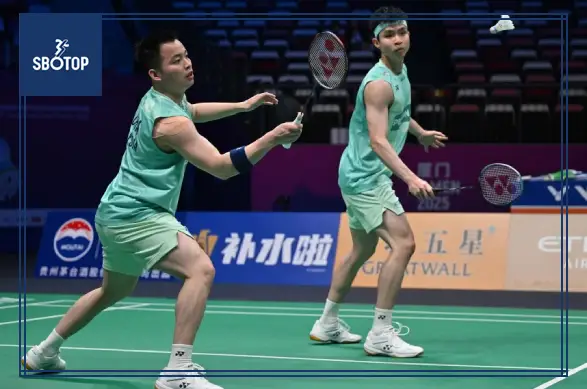Sudirman Cup 2025 – National men’s doubles coach Herry Iman Pierngadi has come to the defence of Malaysian pair Aaron Chia and Soh Wooi Yik after their narrow defeat at the Sudirman Cup 2025. Despite the setback, the experienced Indonesian coach insists the loss was largely a result of unfortunate circumstances rather than a failure of ability or strategy.
Aaron and Wooi Yik, who currently hold the world No. 4 ranking, faced Japan’s top duo, Takuro Hoki and Yugo Kobayashi, in a crucial Group C tie in Xiamen, China. The clash was tight and emotionally charged, stretching into a deciding rubber game. After dropping the first game 12-21, the Malaysian pair fought back valiantly to claim the second game 22-20. However, in the decisive third game, they fell just short, losing 23-21 in heartbreaking fashion.
Their loss proved costly for Malaysia, contributing to a 3-2 team defeat against Japan. As a result, Malaysia finished second in the group, forcing them into a tough quarter-final draw against tournament favorites China — a tie they lost 3-0.
“I genuinely believed Malaysia could go deeper in the tournament,” said Herry in a post-match interview. “Aaron and Wooi Yik were just a bit unlucky against Hoki and Kobayashi. It wasn’t a performance to be ashamed of. They fought hard, and the scoreline shows how close it was.”
Call for Greater Physical Conditioning
While defending the pair’s performance, Herry also used the opportunity to address a key area he believes Aaron Chia and Soh Wooi Yik must urgently improve — their physical conditioning and power on court.
“There were a few unforced errors, yes, but what stood out to me is that they lacked the explosiveness needed to dominate at critical points,” he added. “If they want to consistently challenge the top pairs in the world, they have to invest more time in weight training. Increasing their physical strength will add more bite to their smashes and improve their staying power during long rallies.”
Herry stressed that adding strength isn’t just about hitting harder — it’s about developing the stamina and muscle endurance to stay sharp in intense matches. “It’s about being able to maintain aggression and control from start to finish,” he said. “At this level, margins are tiny, and that little bit of added power can make all the difference.”
Controversial Selection Sparks Debate
There was some pre-match controversy surrounding Malaysia’s decision to field Aaron and Wooi Yik in that critical tie, especially given their unfavorable head-to-head record against the Japanese pair — just two wins from ten prior meetings.
Some critics argued that national selectors missed an opportunity by not opting for independent pair Goh Sze Fei and Nur Izzuddin Rumsani, currently ranked world No. 2. The duo had convincingly beaten Hoki and Kobayashi at the Asian Championships in Ningbo just weeks earlier, showing excellent form and tactical execution.
However, Herry was quick to dismiss such criticisms. “It’s easy to question selections after the result, but Aaron and Wooi Yik have the experience of performing on big stages. They are Olympic bronze medallists and have the maturity needed for high-pressure matches,” he said. “Sometimes things just don’t go your way.”
Tactical Missteps and Tough Consequences during Sudirman Cup
While Herry maintains confidence in the duo’s ability, there’s no denying that Malaysia’s early clash with China could have been avoided with different tactical decisions in the group stage. By finishing second to Japan, they lost the chance to face a potentially less formidable opponent in the quarter-finals — a crucial miscalculation in a tournament where strategic match planning is essential.
As Japan cruised to a 3-0 win over Chinese Taipei to book a semi-final clash with China, Malaysia’s campaign came to an abrupt end, leaving fans and officials to reflect on what might have been.
Looking forward, the message from Herry is clear: the talent is there, but physical development must now become a priority. “Aaron and Wooi Yik are still one of our best hopes for major titles,” he concluded. “But to turn near misses into victories, they must evolve — and that evolution begins in the gym.”
ALSO READ :










